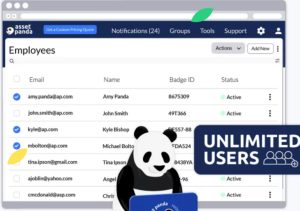Through the Moleskine Foundation and WikiAfrica, students are trying to address the lack of information about Africa on Wikipedia.
” data-credit=”Image: Moleskine Foundation”>
Adama Sanneh, co-founder and CEO of the Moleskine Foundation, helping a student.
Image: Moleskine Foundation
Wikipedia, one of the most well-known and frequently visited sites on the internet today, is celebrating the 20th anniversary of its founding in 2001 by Jimmy Wales and Larry Sanger. The site has more than 56 million articles in 321 languages, but the site’s creators are using the anniversary as an opportunity to highlight one of the biggest criticisms of the site: the lack of information about Africa.
Wikipedia is the 10th-most visited site on earth, but in an interview, Adama Sanneh, co-founder and CEO of the Moleskine Foundation, explained that there are more entries about the City of Paris than about the entire African continent.
To address this problem, Wikipedia has worked with Sanneh, the Moleskine Foundation and thousands of young people across the continent to add more information about the dozens of countries and cultures across Africa.
In an interview, Sanneh said young Africans are now creating, expanding and enhancing Wikipedia content about Africa into more than 17 African languages including Swahili, Igbo and Yoruba. Much of this new information includes lifesaving COVID-19 content related to vaccination and social distancing.
SEE: Big data’s role in COVID-19 (free PDF) (TechRepublic)
The Moleskine Foundation’s WikiAfrica Education initiative immerses young people in experiences that combine knowledge and activism, inspiring them to participate in the production of knowledge, rather than just its consumption.
Sanneh said that since helping to launch WikiAfrica in 2006 with a number of different groups, it has generated over 40,000 Wikipedia contributions, and over 200 articles in 18 languages about COVID-19 in the past year alone. Sanneh, the son of an Italian mother and a Senegalese/Gambian father, has lived on both continents, and said misconceptions and misinformation about Africa shape the way the world sees the continent—and even how Africans see themselves.
“We’re missing a tremendous opportunity to tell the story from the perspective of the protagonist and really develop more language, more possibilities, more imagination. People on the continent don’t see themselves reflected online. I grew up in Italy where, as a minority, I didn’t exist. There is nothing online that can reflect my experience,” Sanneh said.
“So we were looking for ways to tackle this. How can we support a creative process in which we can transform young people from passive knowledge consumers into active knowledge producers about themselves? Wikipedia is a great invention that allows you to do exactly this. Wikipedia allows you to tell your story, in your environment, using your own language.”
Sanneh explained that one of the first events the organization held was a workshop in South Africa with the museum complex Constitution Hill.
They brought dozens of young people together to work on 12 Wikipedia entries or profiles on Black women that were erased by history. The articles garnered more than 200,000 views within a few days.
“It was really a moment where we could showcase how knowledge, creativity, activism and technology come together to transform one person, but through the transformation of one person, they enable the transformation of the community,” he said.
For Sanneh, one of the biggest parts of the program is to empower young people across Africa to take control of their own narrative and take the initiative themselves to explain their cultures to the world.
Most of what has been written online about Africa has come from the West, and Sanneh has focused the Foundation’s work on empowering a new generation of Wikipedia editors based in Africa.
“We don’t have solutions, but what we try to do is encourage them to create change, learn about it themselves and use technology in a very scalable and effective way,” he said.
Perry Mason Adams, a student and one of the Moleskine Foundation’s most productive members, joined the organization’s latest online campaign on COVID-19, aiming to write articles about the pandemic on Wikipedia in African languages.
“I collaborated with my mom to write the articles, and she did the proofreading and I did the translation of the base article in English to IsiXhosa and IsiZulu. The process was so enriching and eye-opening for the both of us. My mom said reading the article in isiZulu ‘took her back to her schooling days’ because there isn’t enough material on the internet in our native tongues. I encourage everyone to join in and narrow the knowledge gap on the internet,” Adams said.
“Being a part of this program means that I can be a part of the solution to bridging the knowledge gap on the internet, promoting the use and perseveration of our indigenous languages and doing such important work from a fresh perspective.”
Adams said having information in local languages was pivotal for the future and cited a famous quote from former President of South Africa Nelson Mandela, who once said talking to a person in a language they understand goes into the person’s head, but talking to the person in their native language goes to their heart.
Adams said seeing the reaction of his mother drove home the importance of using technology to preserve indigenous languages, and the need for local information about COVID-19 was vital.
“It has been both a learning and rewarding experience. Learning in the sense that it has made me more curious about the use of our indigenous languages. Rewarding being, a part of the generation that not only uses the language but preserves it as well,” Adams said.
Sanneh noted that much of his work was about using creativity and technology for social change while also providing spaces for young people across Africa to express themselves and share information.
The organization has started a new podcast titled “Creativity Pioneers” that focuses on solving inequality and racial injustice through creativity.
“We are a process-oriented organization and we believe that if we create this content, if we support young people to develop those tools, if we create spaces where these young people can thrive and can exercise their criticality imagination, then we can really have the possibility to create some change,” he said.
“We live in the creativity era. We live in an era where information is not at the center anymore. It’s not enough anymore. Not even knowledge is at the core. The core is creativity, because the question is, how are we going to be able to use information and the knowledge? We believe that creative spaces are integral to giving a chance to many communities—especially marginalized communities—to really build and imagine a different future.”
Also see
Source of Article




